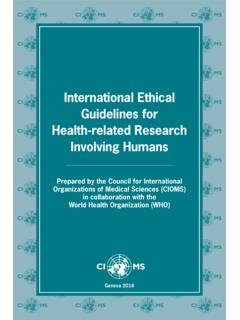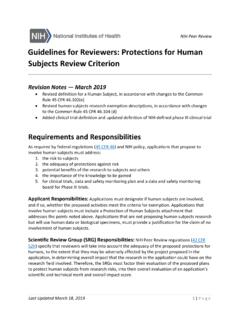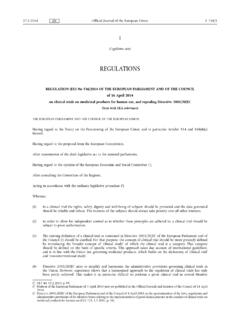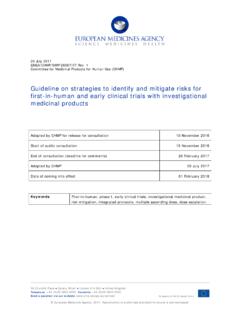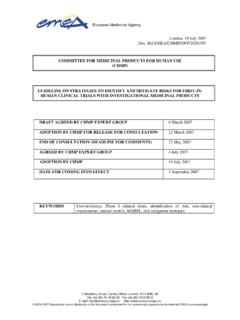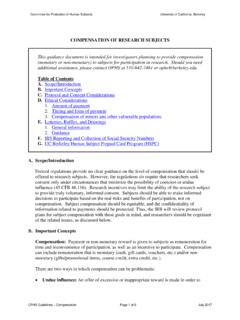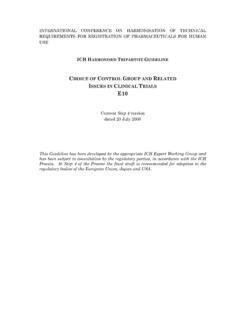Transcription of INDIAN COUNCIL OF MEDICAL RESEARCH
1 INDIAN COUNCIL OF MEDICAL RESEARCH2017 NATIONAL ETHICAL guidelines FOR BIOMEDICAL AND HEALTH RESEARCH INVOLVING human PARTICIPANTSC ompiled & Edited by:Dr. Roli MathurHead, ICMR Bioethics UnitNCDIR, BengaluruPublished by: Director-General INDIAN COUNCIL of MEDICAL RESEARCH New Delhi 110 029 : 978-81-910091-94 October, 2017 Price: Copyright INDIAN COUNCIL of MEDICAL RESEARCH The use of content from this book is permitted for all non-commercial purposes giving full acknowledgement to ICMR which shall not be held liable for any damages whatsoever as a result of the use or application of the contents of this document.
2 ICMR reserves the right to update and change the contents without notice and accepts no liability for any errors or omissions in this regard. Care has been taken to present the information accurately, however the reader is urged to check latest notifications/rules/regulations by GOI from time to and layout:The cover page drawing depicts the sections of this Padma, Kalyani Thakur, Rajib K Hazam and Monesh B VishwakarmaTABLE OF CONTENTSM essage from Hon ble Union Minister for Health and Family Welfare, Government of India ix Foreword by DG ICMR and Secretary DHR xMessage from President, MEDICAL COUNCIL of India xi Preface by Chairperson, Central Ethics Committee on human RESEARCH xiiMessage from Chairperson.
3 Advisory Group xiiiAcknowledgement xivIntroduction 1 Scope 2 Section 1 Statement of general principles General principles 3 Section 2 General ethical issues Benefit-risk assessment Informed consent process Privacy and confidentiality Distributive justice Payment for participation Compensation for RESEARCH related harm Ancillary care Conflict of interest Selection of vulnerable and special groups as RESEARCH participants Community engagement Post RESEARCH access and benefit sharing 12 Section 3 Responsible conduct of RESEARCH Values
4 Of RESEARCH Policies Planning and conducting RESEARCH - specific issues 15 Reviewing and reporting RESEARCH 17 Responsible authorship and publication RESEARCH misconduct and policies for handling misconduct Registration with Clinical Trials Registry- India Collaborative RESEARCH 21 Section 4 Ethical review procedures Terms of reference for ethics committees (EC) Special situations Composition of an EC 27 Terms of reference for EC members Criteria for selection of EC members Training Roles and responsibilities of EC Submission and review procedures Full committee meeting Review of multicentric RESEARCH Continuing review Site monitoring Record keeping and archiving Administration and management Registration and accreditation of ECs 48 Section 5 Informed consent process Requisites Essential information for prospective RESEARCH participants Responsibility of researchers
5 Documentation of informed consent process Electronic consent Specific issues in clinical trials Waiver of consent Re-consent or fresh consent Procedures after the consent process Special situations Consent for studies using deception 55 Section 6 Vulnerability Principles of RESEARCH among vulnerable populations Additional safeguards/protection mechanisms Obligations/duties of stakeholders Women in special situations Children RESEARCH involving sexual minorities and sex workers RESEARCH among tribal population RESEARCH involving individuals with mental illness or cognitively impaired/affected individuals Individuals who have diminished autonomy due to dependency or being under a hierarchical system Patients who are terminally ill Other vulnerable groups 68 Section 7 Clinical trials of drugs and other interventions General guidelines Clinical drug/vaccine development Bioavailability/bioequivalence study Ethical implications of study designs Multicentric trials Phytopharmaceutical drugs Device trials Biologicals and biosimilars Clinical trials with stem cells Surgical
6 Interventions Community trials (public health interventions) Clinical trials of interventions in HIV/AIDS Clinical trials on traditional systems of medicine Trials of diagnostic agents Radioactive materials and X-rays Investigator initiated clinical trials Clinical trials on contraceptives Pregnancy and clinical trials Clinical trials in oncology Clinical trials of products using any new technology Synthetic biology 91 Section 8 Public health RESEARCH Principles of public health RESEARCH ethics Ethical issues of epidemiological and public health RESEARCH study designs Use of administrative and other data
7 Sources for RESEARCH Informed consent Role of EC Protecting participants and communities Stakeholders in public health RESEARCH 103 Section 9 Social and behavioural sciences RESEARCH for health Some key features Addressing the ethical challenges 105 Section 10 human genetics testing and RESEARCH General issues Genetic counselling Privacy and confidentiality Informed consent Culturally sensitive issues Storage of samples for future genetic RESEARCH Results of genetic testing Publication aspects Commercialization and COI Role of the team in genetic testing and RESEARCH Quality standards of the laboratory Misuse of genetic technology Genetic diagnosis/testing and screening Gene therapy Use of newer technologies RESEARCH on human embryos Foetal autopsy 126 Section 11 Biological materials.
8 Biobanking and datasets Biobanking Storage of biospecimens and data with their personal identifiers Ethical issues related to donors Ethical issues related to RESEARCH Biological material/data in forensic departments of laboratories Governance of biobank/biorepository Special issues related to datasets Contingency plan 136 Section 12 RESEARCH during humanitarian emergencies and disasters Pre-emptive RESEARCH preparation for humanitarian emergency Informed consent requirements Risk-minimization and equitable distribution of benefits and risks Privacy and confidentiality Ethics review procedures Post RESEARCH benefit Special considerations Continuation of ongoing RESEARCH when a humanitarian emergency occurs International participation in RESEARCH 141 List of references 143 Suggested further reading 146 Abbreviations and acronyms 150 Glossary 152 Annex 1 Standard operating procedures 160 Annex 2 List of members of committees involved in revision of guidelines (2015-2017) 161A.
9 Members of Central Ethics Committee on human RESEARCH 161B. Chaipersons of Sub-Committees and Members of Advisory Group 162 C. Members of Sub-Committees/Invited Experts 162D. Members National Consultation, ICMR, New Delhi 164E. Members Regional Consultation, NCDIR, Bengaluru 167F. Secretariat 170G. Admin and Finance 170ixxxixiiMedical profession is probably the oldest one to prescribe ethical guidelines . Such guidelines for practically all aspect of professional conduct were provided both in Caraksamhita and Susrutasamhita. Rapid advances in the whole field of biomedical sciences have added newer responsibilities and complex dilemmas for MEDICAL persons both practitioner and researchers.
10 It would be correct to say that every advance in MEDICAL science results in added moral responsibility. ICMR has always been on the forefront to set the standards for ethics in biomedical and health RESEARCH . The COUNCIL brought out a policy document in 1980, which was revised in 2000 and further revised in 2006. The latest version of guidelines has addressed the newer emerging ethical issues keeping in view the social, cultural, economic, legal and religious aspects of our country. Ethics is a subject of discussions and debates and each and every word and line in the revised guidelines have been deliberated upon by a group of experts and have gone through a process of consultation and debate before it has been f

